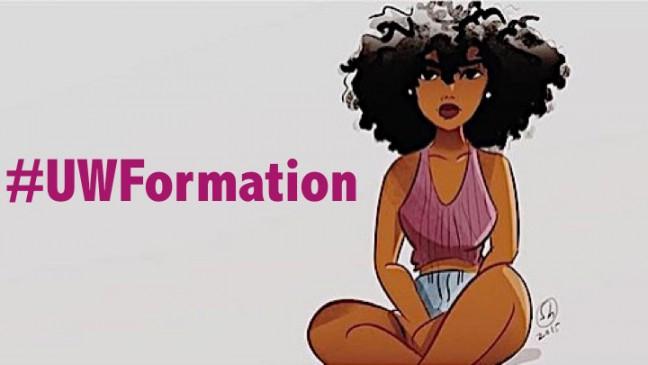Two UW sophomores are fed up the with racial hate and bias incidents at the University of Wisconsin and in the Madison area.
Their response: fighting back with positive imagery through UWFormation, a social-media based photo and video project.
After seeing a similar project of the University of Maryland called #UMDMelanin, UWFormation creator Gabby Tielman-Fenelus began her project to combat hate and bias incidents on campus. Fellow UWFormation creator Kay-Jah Charles felt the project would be a positive addition to existing movements on campus, such as Black Lives Matter and #TheRealUW.
University official confirms new incident of hate and bias on campus
When Tielman-Fenelus first arrived on campus, she said she experienced a culture shock. Despite having previously attended predominately white schools, she felt as if she didn’t belong at UW, or that she had to prove to others why she belonged.
“I knew that I deserved to be here and that I worked hard to be here, but in classes I would be completely ignored and if I made a statement, people wouldn’t acknowledge me,” Tielman-Fenelus said. “It was discouraging, but that’s what sparked my interest in [Black Lives Matter].”
Charles had similar experiences when she got to UW. She too attended mostly white schools in the past, but found a different air of exclusivity at UW.
“If you told me three or four years ago that I would be a part of something that spoke on the beauty and experience of black women, I would have never believed that because years ago, I never thought that would have to happen,” Charles said. “It wasn’t necessary in [NYC], but here, sometimes we just need to say things.”
Tielman-Fenelus said she’s constantly told students of color, like her, have taken the place of other potential students. Through this project, she hopes to counter these notions and give women the opportunity to show not only their right to be here, but the positive impact they are leaving as well.
The project also uses its online setting to full advantage. Charles believes the beauty of UWFormation is that it allows those who do not feel comfortable being on the frontline during protests — or other similar events — to voice their beliefs and contribute from a distance, without being “so out there.”
Charles also said the whole project is directed toward emphasizing the positivities of the black experience despite the struggles presented at UW. Tielman-Fenelus said UWFormation gives black women on campus the ability to speak for and present themselves and to feel beautiful, opportunities that she said are often taken away or neglected.
Currently, the project features photos of a diverse group of black women on campus. Tielman-Fenelus said they wanted a diverse group of women in terms of major, year, body type, skin tone and most importantly, campus experiences.
“We wanted different people to really show that you don’t have to be a certain way to be a part of the movement,” Charles said.
While both Tielman-Fenelus and Charles didn’t want to give away too much about the future plans with UWFormation, they hinted that their work over the past semester is only a “prequel” of what’s to come. What Tielman-Fenelus did reveal, however, is that a video is in the works, which will be presented during the fall semester to recruit more students of color, specifically black women.
Tielman-Fenelus added that the video will take a holistic approach, asking all of UWFormation’s subjects: “What does UWFormation mean to you?”
“The beauty of [UWFormation] is that it let’s you think about what were talking about instead of taking it for just face value,” Charles said. “It’s not just a picture of a woman, it’s a picture of experience.”














